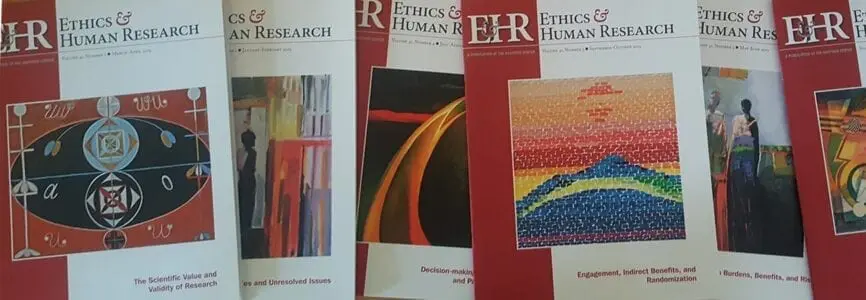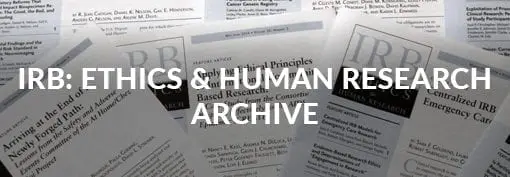Ethics & Human Research
Ethics & Human Research (formerly IRB: Ethics & Human Research) aims to foster critical analysis of issues in science and health care that have implications for human biomedical and behavioral research, including developments that bring new challenges to existing ethical, regulatory, and policy frameworks governing research with humans in the United States and elsewhere. Six issues of the research ethics journal are published each year, containing an assortment of commentaries, case studies, peer-reviewed scholarly articles, and book reviews.
To access supporting information for articles in E&HR, such as tables, figures, and appendices that do not appear in the journal itself, see this page.
For prior issues of IRB: Ethics & Human Research, please visit Jstor.org.
Authors include experts in research ethics who come from a wide range of academic disciplines and professions, researchers who conduct biomedical and behavioral research, and policy-makers. We welcome submissions from new authors. E&HR’s readership includes ethics committee members, institutional leaders, researchers, and scholars from many academic disciplines.
Our submissions guidelines can be found here.
For permissions, contact Wiley Online Library.
|
Karen Maschke, editor Julie Chibbaro, managing editor Laura Haupt, consulting editor Nora Porter, art director, assistant editor | Editorial Board
Laura Beskow, PhD, MPH Vanderbilt University Barbara Bierer, MD Harvard University Alex Capron, LLB University of Southern California Stephanie Solomon Cargill, PhD St. Louis University Rebecca S. Dresser, JD, MS Washington University in St. Louis Carl Elliott, MD, PhD University of Minnesota Holly Fernandez Lynch, JD, MBE University of Pennsylvania Joseph J. Fins, MD Weill Cornell Medical College Paul Ford, PhD Cleveland Clinic Cristine Grady, MSN, PhD National Institutes of Health Clinical Center Steven Joffe, MD, MPH University of Pennsylvania Jonathan Kimmelman, PhD McGill University Nancy M. P. King, JD Wake Forest University Susan Lederer, PhD University of Wisconsin–Madison Alex John London, PhD Carnegie Mellon University Suzanne Rivera, PhD, MSW Case Western Reserve University Mark A. Rothstein, JD University of Louisville Laura Stark, PhD Vanderbilt University Jeremy Sugarman, MD, MPH, MA Johns Hopkins University Benjamin S. Wilfond, MD Seattle Children’s Research Institute |
ISSN 2578-2355 print; ISSN 2578-2363 online
Publisher: Wiley












